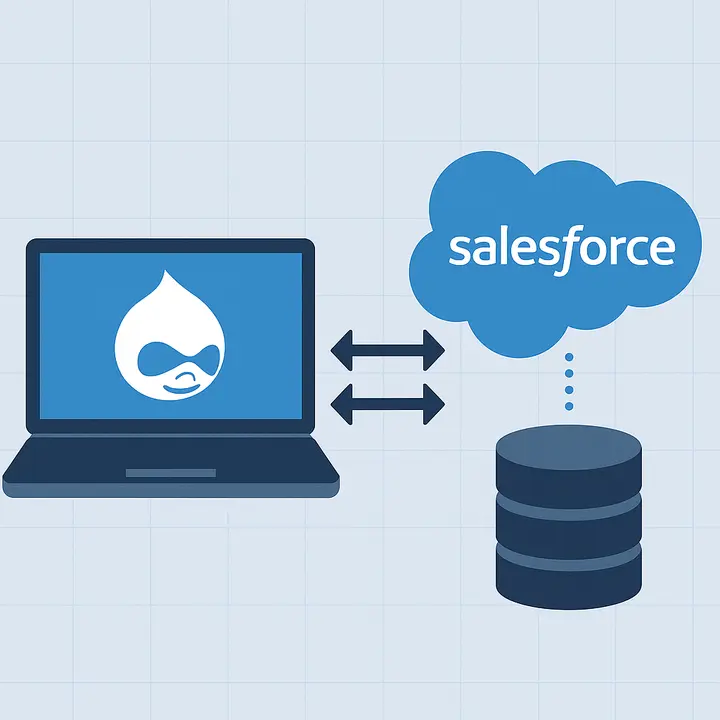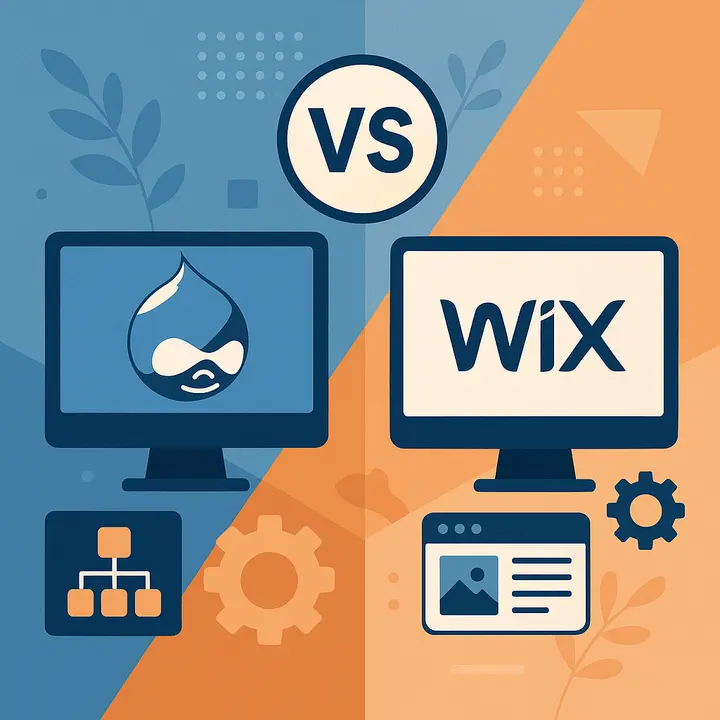Choosing the right content management system (CMS) is one of the first and most essential steps in website development. The CMS you select determines how easy it is to publish content, how secure and scalable your site will be, what integrations and third-party tools you can adopt, and how much developer time and budget you’ll need over the long run. In 2025, businesses continue to rely on a few popular content management systems, with two of the most common choices being Drupal and Joomla. Both are open-source PHP CMS solutions backed by strong communities; however, the Drupal vs. Joomla comparison reveals that each platform has its own unique strengths.
Drupal vs Joomla: Which Content Management System Is Better for Site Management in 2025?

Drupal is often favored for complex websites, government portals, and enterprise projects that demand high security and scalability. Joomla, on the other hand, offers a wide range of features out of the box, along with a broad selection of templates and extensions, making it attractive to teams that prioritize editor-friendly workflows and fast deployment. In this guide, we’ll walk you through a practical comparison of Joomla and Drupal, outlining the main differences and advantages, exploring their eCommerce and SEO potential, and highlighting which platform is the more secure CMS for your specific needs. Expect concise explanations, real-world examples, and a decision framework to help you choose the best fit for your project.
What Is Drupal CMS? Key Features and Advantages
Drupal was first released in 2001 by Dries Buytaert as an open-source content management system (CMS) built in PHP. Over the years, Drupal provides a modular, developer-friendly framework that separates a lean core from pluggable modules and themes. This architecture is especially effective for site development, where complex content models, multilingual setups, multisite management, and granular permissions are essential. Unlike some beginner-oriented platforms, Drupal is designed for experienced developers who need flexibility, security, and scalability at an enterprise level.
One of the main reasons many organizations consider Drupal the better choice for high-stakes projects is its security-first culture. A dedicated security team ensures regular updates, and the “never hack core” philosophy guarantees long-term stability. This makes Drupal a best CMS option for governments, financial institutions, and universities that cannot afford downtime. Large organizations like NASA, Tesla, Oxford, and Harvard all run mission-critical Drupal websites, proving its enterprise adoption.
Of course, Drupal’s developer-first nature means the learning curve is steeper compared to a user-friendly interface like Joomla’s. Still, the payoff comes with Drupal hosting large-scale projects that need high security, seamless integrations, and the ability to grow without limitations.
Key highlights of Drupal

- Security-first reputation
Trusted by governments and financial institutions, Drupal is recognised for its proactive security team, regular software updates, and rigorous coding standards.
- High scalability
Handles massive traffic and complex architectures, making it suitable for global brands, enterprise-level projects and complex websites.
- Content flexibility
Offers custom content types, views, taxonomies, and multilingual support out of the box, ideal for structured and diverse content.
- Enterprise adoption
Used by organizations like NASA, Tesla, and top universities (Oxford, Harvard), which demonstrates its reliability in high-stakes environments.
- Developer ecosystem
Backed by thousands of contributed modules and themes, plus active community support for extending functionality.
What Is Joomla CMS? Strengths of This PHP Platform
Joomla and Drupal are two of the most widely used open-source CMS platforms, but Joomla has a different focus. Joomla was first released in 2005 as a fork of the Mambo project and quickly grew into one of the most popular CMS solutions after WordPress and Drupal. It offers a balance between editor usability and developer flexibility: Joomla also offers more out-of-the-box features for faster site development while still allowing customization through thousands of templates and extensions.
For businesses that prioritize ease, Joomla offers a wide range of built-in tools such as multilingual support, menu management, and content versioning, all included in the core. The user-friendly interface makes it easier for marketers and editors to manage content without relying heavily on developers. With accessible Joomla hosting options and a large user base, it’s often considered when teams want a CMS that reduces complexity but remains flexible.
The official Joomla showcase highlights thousands of real-world projects, from corporate portals to community sites. Brands like IKEA, Nintendo, and Lipton utilise Joomla for their websites, demonstrating the platform’s ability to scale beyond small businesses. And since Joomla are free to download and backed by a global community, ongoing support and innovation remain strong.
Key highlights of Joomla
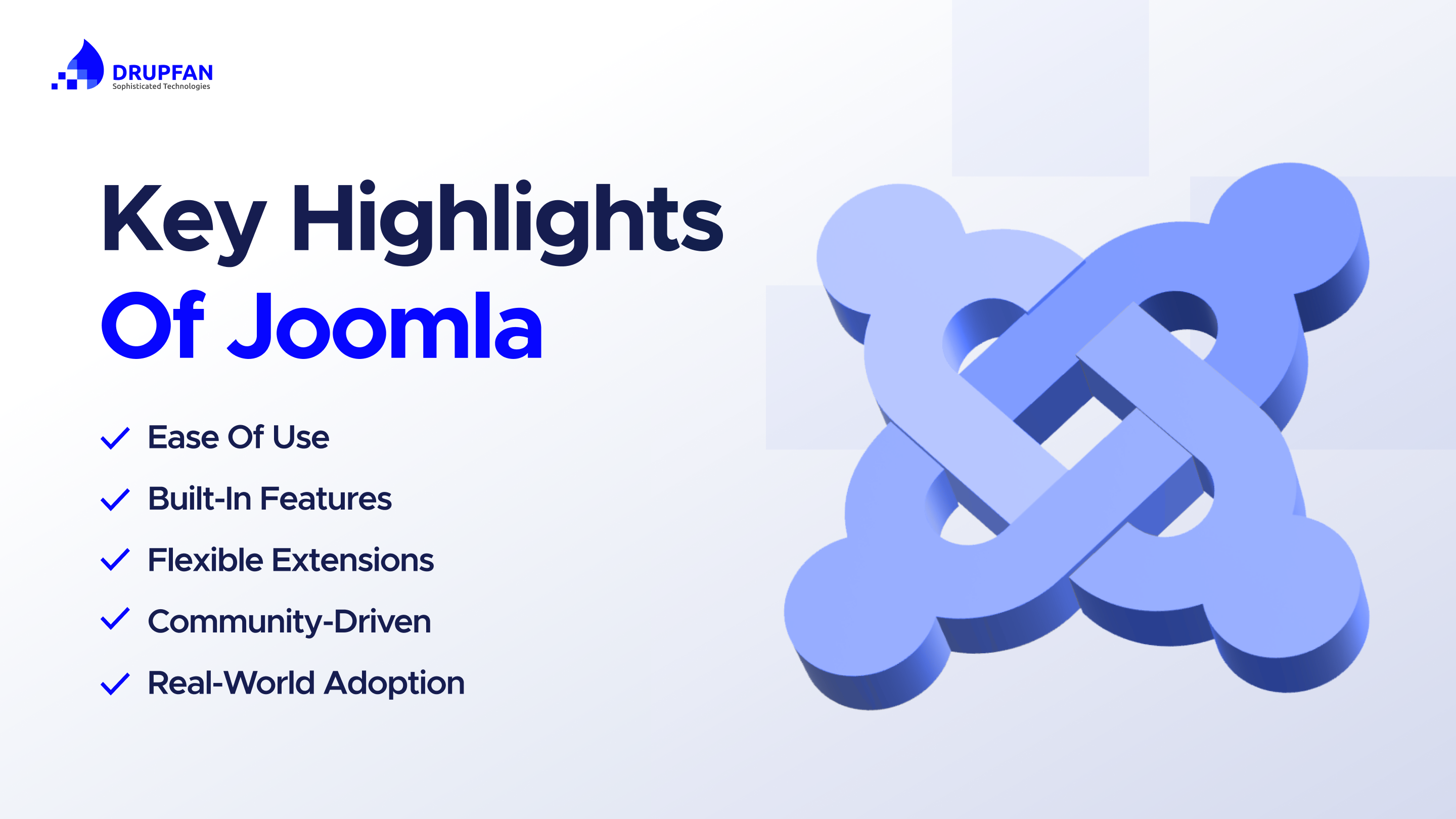
- Ease of use
Offers a user-friendly admin panel that allows non-technical users to manage content with less training compared to Drupal. A more straightforward, user-friendly interface than Drupal.
- Built-in features
Ships with strong multilingual support, content versioning, and menu management directly in core, reducing reliance on add-ons.
- Flexible extensions
Provides thousands of extensions and templates that allow businesses to extend functionality without heavy custom coding.
- Community-driven
Supported by a global community that contributes to regular updates, documentation, and knowledge-sharing.
- Real-world adoption
Used by companies like IKEA, Nintendo, and Lipton, proving its capability to run recognizable brand websites at scale.
Drupal vs Joomla: Quick Comparison Table of Key Differences
When businesses evaluate content management systems, one of the first questions is how the platforms stack up side by side. Drupal and Joomla are two of the most popular open-source CMS solutions written in PHP, yet they have evolved in different directions. Drupal is better known as a robust CMS for enterprise-grade projects, trusted by governments, universities, and global organizations that need secure, scalable, and highly customizable platforms. Joomla websites, meanwhile, appeal to teams that want a balance: more flexibility than WordPress, but a lighter lift than Drupal.
Comparing Drupal vs Joomla shows how each CMS offers unique advantages. Drupal also emphasizes long-term stability, modular customization, and enterprise-level security, making it suitable for complex digital ecosystems. Joomla, on the other hand, positions itself as the better choice for smaller organizations and publishers who value usability, built-in features, and accessible site management.
For decision-makers trying to decide between Drupal and Joomla, the key factors often come down to security, scalability, ease of use, and ecosystem maturity. Although Joomla and Drupal share their open-source roots, their strengths serve very different needs, which is why no single answer can define which one is better across all cases.
Here’s a side-by-side overview of the two CMS platforms to set the stage:
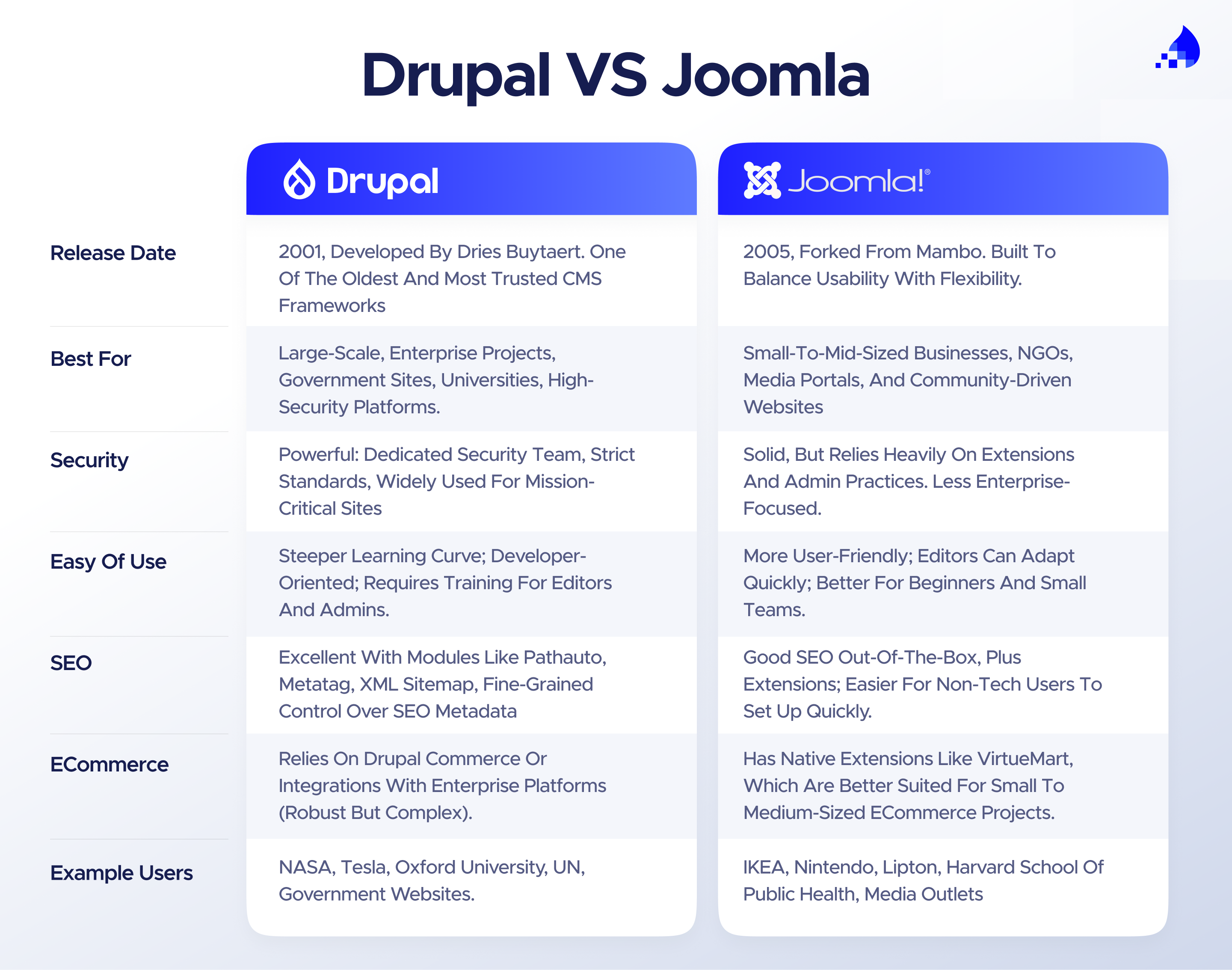
Security & Reliability in Joomla vs Drupal CMS Platforms
Security is one of the most decisive factors when choosing a CMS in 2025. Both Drupal and Joomla are open-source and regularly updated; however, their approaches to vulnerabilities and reliability differ significantly. Explore more with Drupfan team:
Drupal Security & Reliability
- Enterprise-grade security: Drupal has a dedicated Drupal Security Team that actively monitors, audits, and releases security advisories (SA-CORE updates). This makes it trusted by governments, financial institutions, and large corporations.
- Granular permissions system: Drupal’s role-based access control allows highly customized user permissions. Organizations can restrict access at multiple levels (fields, nodes, content types).
- Community vigilance: With 1+ million developers worldwide, issues are flagged and patched quickly. The community strictly discourages “hacking core,” which reduces vulnerability risks.
- Reliability for mission-critical projects: Because it’s designed with modularity and reusability, Drupal is resilient to downtime, and enterprise setups often rely on multisite and multilingual architecture.
- Examples: The White House (historically), NASA, Tesla, and universities utilise Drupal due to its substantial compliance with GDPR, accessibility standards, and security protocols.
- Verdict: Drupal is the clear leader for high-security and enterprise environments, while Joomla is secure enough for SMBs with proper extension management.
Joomla Security & Reliability
- Good but less enterprise-focused: Joomla has built-in Two-Factor Authentication (2FA), reCAPTCHA integration, and session management tools, making it secure enough for most SMB websites.
- Extension dependency: Much of Joomla’s functionality relies on third-party extensions, which can become security risks if not maintained. This means admins must carefully vet and update add-ons.
- Community-driven monitoring: Security fixes are released regularly, but the security team is smaller compared to Drupal’s dedicated global network.
- Reliability for SMBs: Joomla is well-suited for community-driven projects, civic websites, and SMB portals. However, at the enterprise level, its reliability heavily depends on the quality of hosting and extensions.
- Examples: IKEA and Lipton run Joomla-based projects, typically for regional campaigns or microsites, rather than enterprise-critical platforms.
- Verdict: Drupal is the clear leader for high-security and enterprise environments, while Joomla is secure enough for SMBs with proper extension management.
Joomla and Drupal Advantages and Disadvantages
Let’s highlight the key pros and cons of Joomla vs. Drupal development.
Drupal Advantages
- Perfect for complex enterprise-level projects.
- The strong community regularly contributes to Drupal support & security.
- Regular core & module updates and advisories.
- High level of security.
- Advanced SEO settings.
- Mobile-friendly design.
Drupal Disadvantages
- Requires coding skills.
- More complex to set up than other content management systems.
Joomla Advantages
- Easy and intuitive installation process
- No coding skills required for content management.
- Offers extensions for additional functionality.
- Out-of-the-box search engine optimization.
Joomla Disadvantages
- Low compatibility.
- Customization is not flexible.
- High vulnerability risks.
- Not many extensions are available.
Ease of Use & Learning Curve: Drupal or Joomla for Site Management?
User experience and adoption speed are often make-or-break factors when selecting a CMS. Here’s how they compare:
Drupal Ease of Use
- Steeper learning curve: Drupal is developer-first: it assumes a technical background, and content editors usually require onboarding to manage layouts, nodes, and custom content types.
- Admin interface: The default UI is functional but less intuitive compared to Joomla. However, modules like Admin Toolbar and Gin Admin Theme significantly improve usability.
- Flexibility over simplicity: Drupal prioritises flexibility over ease of use, which is ideal for enterprise projects but can be overwhelming for small businesses.
- Content creation tools: Layout Builder and Paragraphs enable editors to work in a drag-and-drop environment; however, these tools require initial setup by developers.
- Best suited for: Teams that can afford professional developers or agencies and require a platform that scales with their needs.
Joomla Ease of Use
- Balanced learning curve: Joomla hits the middle ground: more flexible than WordPress, but easier than Drupal.
- Out-of-the-box usability: Many features (multilingual, SEO, menu management) are pre-installed in the core, so beginners don’t need many add-ons.
- Content management: Editors find Joomla’s interface more intuitive, with category and menu structures that align with non-technical workflows.
- Customization: While extensions are easy to install, managing too many can clutter the admin and create inconsistencies.
- Best suited for: SMBs, nonprofits, and civic groups that need an approachable system with moderate customization, without hiring full-time developers.
Verdict:
- Drupal: more complex upfront, long-term flexibility for enterprises.
- Joomla: easier to start with, better suited for SMBs and organizations with limited technical resources.
Customization & Scalability: Comparing Drupal and Joomla CMS
One of the main reasons organizations choose a CMS is how well it adapts to long-term growth. Drupal is known for being one of the most customizable and scalable CMS platforms in the world. Its modular architecture enables developers to create highly tailored solutions for complex content models, user permissions, workflows, and integrations with enterprise systems such as Salesforce or SAP. Drupal’s multisite capabilities and multilingual support make it ideal for global brands and universities that run dozens of localized sites from a single codebase.
By contrast, Joomla is moderately scalable and customizable, but with limitations. Its ecosystem of extensions and templates provides flexibility for small-to-medium projects, but large enterprises may hit roadblocks when trying to build highly specialized applications. Joomla offers good support for community portals, directories, and eLearning systems, but it lacks Drupal’s deep granularity for permissions and complex workflows.
Joomla is easier for non-technical users thanks to its intuitive admin panel and editor-friendly interface. For those seeking a CMS that feels simple and approachable, a platform like Joomla is a natural choice. Drupal has a steeper learning curve, but it pays off when projects demand custom workflows, complex integrations, or enterprise scalability.
If you anticipate long-term growth, heavy traffic, or enterprise-grade integrations, Drupal is the safer bet. Joomla is better suited for smaller organizations that want customization without excessive engineering.
eCommerce Capabilities in Drupal vs Joomla (with Comparison Table)
For businesses seeking a CMS, the decision extends far beyond content publishing, especially if e-commerce is part of the plan. The right CMS can make or break your online store, since success depends on handling product catalogues, secure payments, customer accounts, shipping integrations, and marketing automation, all while staying fast and reliable under heavy traffic. Both Drupal and Joomla are great at powering digital experiences, but they approach eCommerce very differently. The choice often depends on whether you’re building and maintaining a professional enterprise-grade system or running a small local shop that needs simplicity and speed.
Both platforms can power online stores, but the approach to eCommerce is very different.
When it comes to visibility and speed, both CMS platforms have strengths, but Drupal leads for enterprise SEO and performance tuning.
Drupal eCommerce
Drupal follows a developer-first philosophy with its dedicated framework, Drupal Commerce. It’s not a plug-and-play tool like Shopify, but a powerful open-source system for building highly customized eCommerce platforms. Developers can fine-tune every aspect from checkout workflows and promotions to complex product catalogs, B2B pricing, and multilingual storefronts. Large organizations often integrate Drupal with enterprise platforms like Magento or BigCommerce to manage advanced requirements while keeping full control of the data.
Joomla eCommerce
By contrast, Joomla also offers eCommerce functionality through extensions like VirtueMart, J2Store, or HikaShop. These are relatively easy to install, making them accessible for small to mid-sized businesses that need to manage websites quickly. However, scaling up to thousands of products or integrating with enterprise systems can be challenging, as the flexibility is more limited compared to Drupal Commerce. Still, for companies that want something lightweight and editor-friendly, a Joomla website with the right extensions can accomplish the task.
Performance
Drupal has robust caching systems (Dynamic Page Cache, BigPipe, Varnish support) and can handle high-traffic sites efficiently. Joomla also performs well for mid-sized projects, but it requires more tuning with third-party plugins for optimal speed under heavy load.
Drupal wins for enterprise-level SEO and high-performance requirements, while Joomla is sufficient for smaller projects with simpler SEO needs.
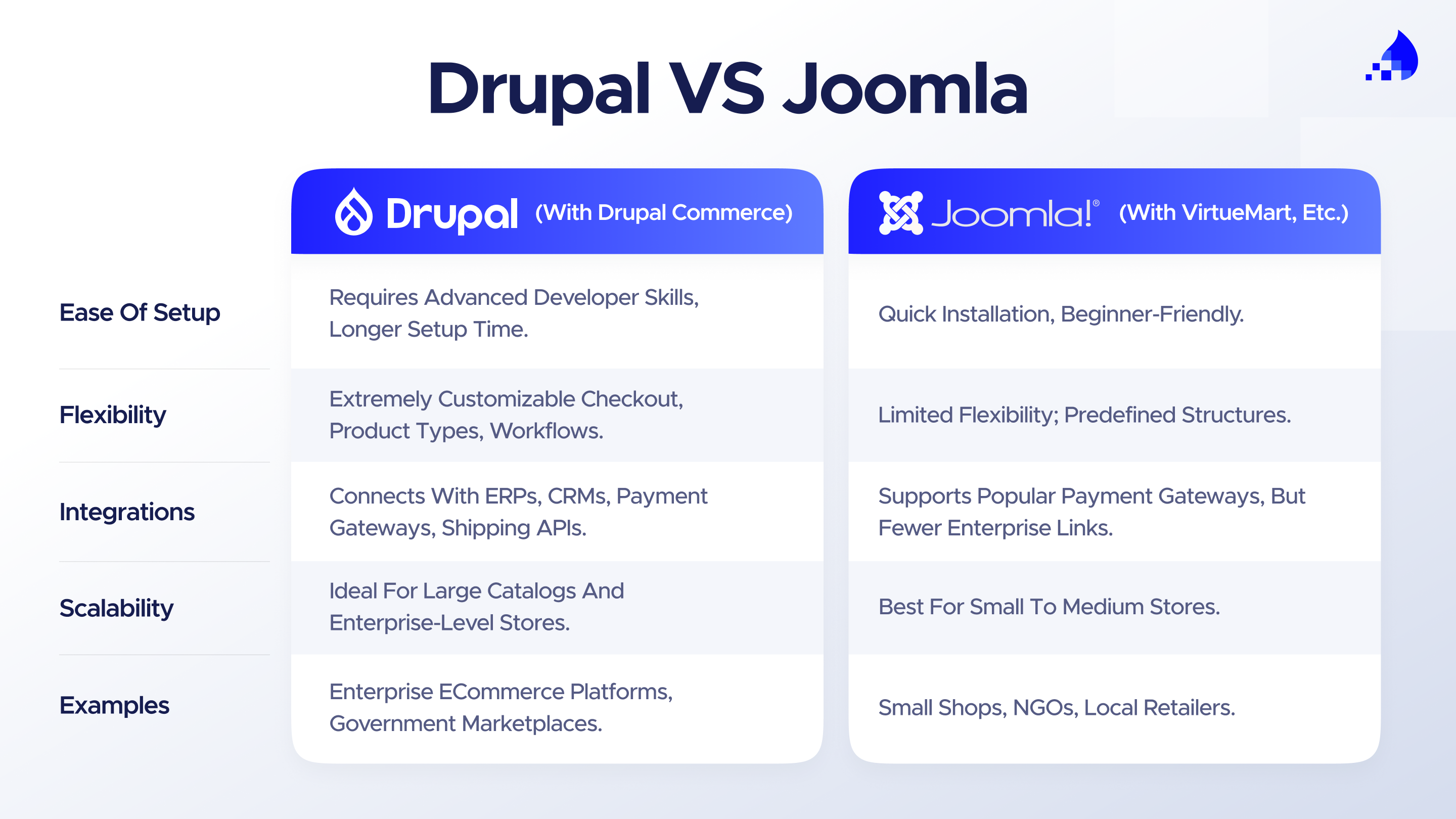
Pros and Cons of Drupal and Joomla CMS Platforms
After breaking down security, scalability, ease of use, eCommerce, and SEO, it’s clear that both Drupal and Joomla bring unique advantages to the table. Drupal shines as a secure, highly customizable, and enterprise-ready CMS, while Joomla appeals to users who value ease of use, faster setup, and a broad range of extensions. No CMS is perfect, and the right choice depends on your project size, technical resources, and long-term goals. The following side-by-side overview highlights the most essential pros and cons to consider before making your decision.
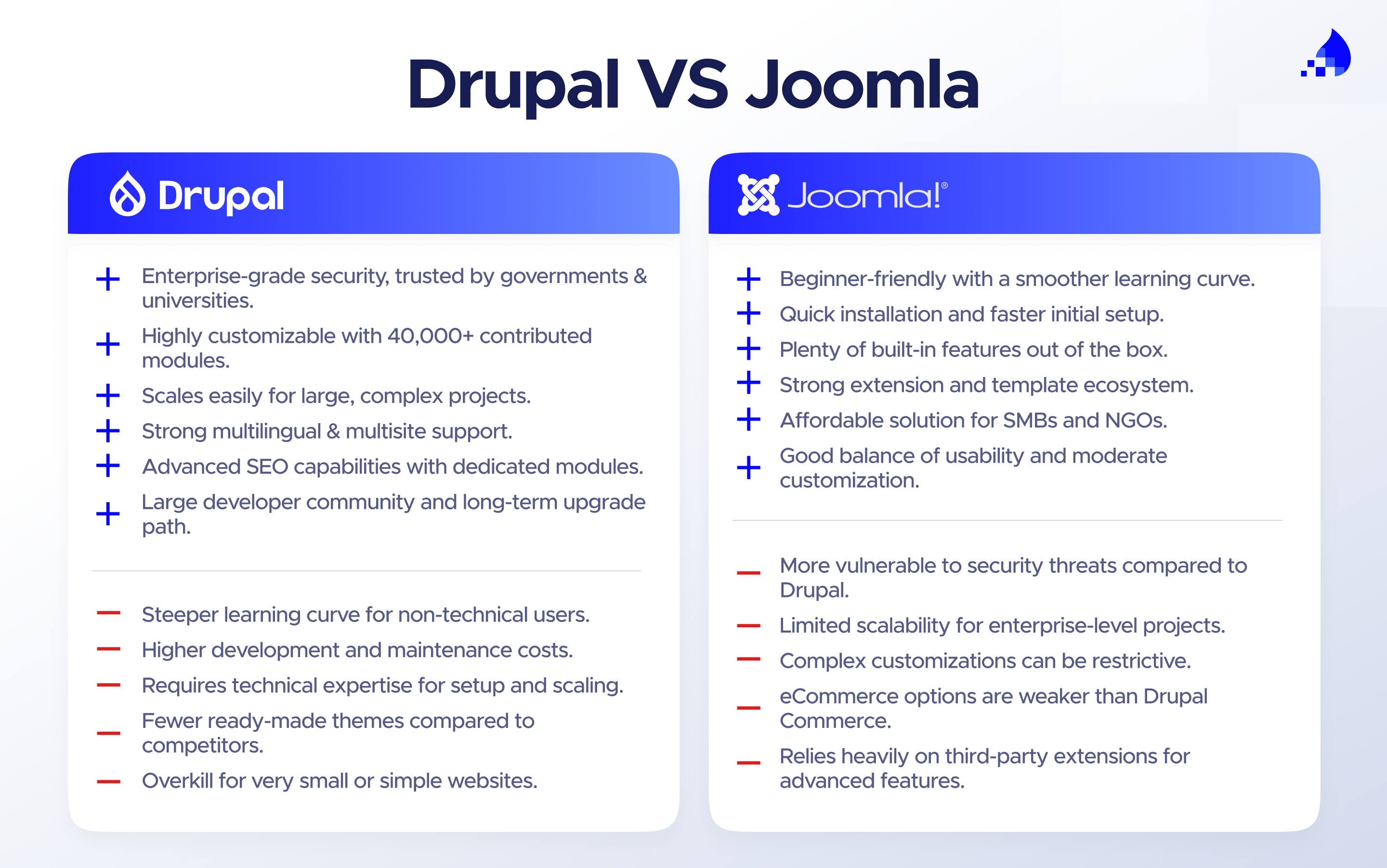
Open-Source CMS Comparison: Drupal vs Joomla vs WordPress
Joomla and Drupal are not the only powerful CMSs that exist. Besides them, the most popular platforms worldwide are WordPress, Blogger, Django, Squarespace, Wix, and MODX. Let’s see what these systems offer and how they differ from Drupal and Joomla.
WordPress VS Joomla VS Drupal
What is similar between Drupal, Joomla, and WordPress in 2025? They are open-source content management systems written in PHP. They all support MySQL databases. WordPress, Joomla, and Drupal have add-on modules, extensions, or plugins that extend the website’s functionality. When discussing technical capabilities, Joomla falls between WordPress and Drupal. You already know the difference between Drupal VS Joomla. But what about WP?
WordPress is the most popular CMS in the world. It is not as technical as Joomla, but it has a more intuitive design and navigation menu. This way, WP beats other platforms in terms of ease of use, numerous plugins & themes, and a quick installation process. However, WordPress can’t be used for complex web development projects that require high customization. That’s where Drupal wins again.
What about Drupal VS WordPress VS Joomla costs? Both CMSs are free to install and use. However, additional extensions for Joomla cost some money, while Drupal modules are free. You also pay for web development services. For example, the minimal custom website on Drupal developed by our Drupfan web agency will take up to six weeks to build.
Joomla VS Magento VS Drupal for eCommerce
We have already talked about Drupal VS Joomla commerce. You already know that Drupal is a more suitable solution. But what about Magento?
Magento is an open-source platform that can only be used for eCommerce of any size. It easily integrates with third-party sites and shipping services. Unlike Drupal and Joomla, the Magento platform was specifically built for online store development. The Drupal VS Joomla VS Magento percent usage (of all websites) looks like this:
Drupal - 1.9%
Joomla - 2.5%
Magento - 0.6%
Drupfan recommends choosing Magento if you want to add eCommerce functionality to your existing website. However, if you create everything from scratch, Drupal is your best bet.
Drupal VS Joomla VS WordPress VS Blogger
The name speaks for itself: Blogger CMS is designed specifically for blog creation. Blogger is a free, fast, and easy publishing platform for people with no coding knowledge. Create a personal or professional blog in one click.
If you need additional features and functionality on your blog website, consider the choice of Drupal, WordPress, or Joomla instead
Drupal VS Joomla VS Django
Django is the least popular CMS among these three competitors. Unlike Drupal and Joomla which are written in PHP, Django uses Python instead. Talking about security, we would place Django higher compared to Joomla but it is still less safe than Drupal. Although Django doesn’t have scheduled security release updates like Drupal, the community around the world contributes to its security cycle on a regular basis.
Joomla VS Drupal VS WordPress VS Squarespace
Squarespace is another powerful CMS. On the contrary Joomla, WP, and Drupal, Squarespace is not free. Web hosting and the entire structure will cost you $12 to $46 / month. It has very limited development and design capabilities. If easy setup and maintenance are a priority for you, Squarespace might be a good option.
WordPress VS Joomla VS Drupal VS Wix
Unlike Joomla, Drupal, and WordPress, Wix is not a content management system. It is a SAAS website building platform with limited tools where you do not own any data. In Wix, you only pay for your website to be displayed. While WP and Drupal are suitable for complex business websites with a lot of data and content, Wix can be used for small personal websites, preferably blogs.
<h3>Drupal VS Joomla VS WordPress VS MODX</h3>
MODX is a custom CMS platform developed with flexibility in mind. The main difference between MODX and Drupal, WordPress, and Joomla is that these three systems offer more ready-to-use digital solutions, while MODX requires additional development. MODX offers less functionality and a more straightforward design.
When to Choose Drupal or Joomla: Decision Guide for 2025
Choosing between Drupal and Joomla isn’t about which CMS is “better”; overall, it’s about which one is the right fit for your project goals, resources, and long-term vision.
In short: Drupal is the enterprise powerhouse, while Joomla is the pragmatic solution for smaller organizations.
Choose Drupal if:
- You’re building an enterprise-level or government website that demands the highest level of security and compliance.
- You need to manage large-scale, complex content (multi-language portals, intranets, or knowledge bases).
- Your project requires deep customization, unique workflows, or integrations with ERPs, CRMs, or other enterprise software.
- You anticipate heavy traffic and scalability requirements (universities, global NGOs, media outlets).
- You want to future-proof your platform with a robust upgrade path and a strong developer community.
Choose Joomla if:
- You run a small to mid-sized business, NGO, or community project and want a balance of usability and flexibility.
- You need to launch a website quickly with built-in features and minimal development overhead.
- Your team includes non-technical editors who need an approachable interface for everyday updates.
- You want to keep development costs low while still accessing a wide range of extensions and templates.
- You’re building a forum, directory, or mid-scale eCommerce store that doesn’t need enterprise complexity.
Hire Drupfan Experts for Your Drupal Development Project
No matter which CMS you choose, having the right development partner can make all the difference. At Drupfan, we specialize in enterprise-grade Drupal solutions but also guide businesses evaluating different CMS options.
- Enterprise expertise: Our team has delivered secure, scalable websites for industries ranging from education and government to eCommerce and NGOs.
- Full-service approach: From CMS selection and custom development to ongoing support and optimization.
- Global mindset: We understand the challenges of multilingual, multi-regional projects and can tailor solutions for international audiences.
- Proven results: Whether it’s a high-traffic government site or a custom eCommerce platform, Drupfan has helped organizations achieve measurable success.
- Dedicated support: Beyond the build, we offer long-term maintenance, security monitoring, and continuous improvements.
With Drupfan as your partner, you gain access to developers and a strategic team dedicated to your project’s growth and sustainability.
Keep your website up and running with Drupal development services and ongoing Drupal support from Drupfan. Our team of professionals will ensure that your unique business vision becomes a reality.
FAQ: Drupal vs Joomla (2025 Edition)
Is Drupal more secure than Joomla?
Yes. Drupal has a dedicated global security team, strict coding standards, and is widely trusted by governments and organisations worldwide. If you’re looking for a CMS with enterprise-grade protection, Drupal is often the safer choice. Joomla can also be secure, but it requires more careful management of third-party extensions.
Which CMS is easier for beginners?
For non-technical users, a platform like Joomla is usually easier to adopt thanks to its intuitive admin panel and editor-friendly interface. Drupal has a steeper learning curve, but it pays off when projects demand custom workflows, complex integrations, or enterprise scalability.
Can both CMS platforms handle multilingual websites?
Yes. Drupal has advanced multilingual support built-in. Joomla also supports multilingual sites, but requires more configuration.
Which is better for eCommerce?
Drupal (with Drupal Commerce) is best for enterprise-grade online stores. Joomla (with VirtueMart or HikaShop) works well for smaller eCommerce projects.
Do Drupal and Joomla support SEO optimization?
Both support SEO, but Drupal offers more advanced modules (Pathauto, Metatag, XML Sitemap). Joomla has simpler SEO tools and extensions.
Which CMS has more extensions or modules?
Drupal offers 40,000+ contributed modules. Joomla has thousands of extensions, but Drupal’s ecosystem is more enterprise-focused.
Is Drupal more expensive than Joomla?
The CMS itself is free, but Drupal projects usually require more developer time, making them more costly. Joomla is more affordable for small projects.
Which CMS is faster?
Drupal, with its caching tools (BigPipe, Varnish, and Redis), can handle heavy traffic more effectively. Joomla performs well for smaller sites, but it requires plugins for advanced caching.
Who uses Drupal?
Organizations like NASA, Tesla, the UN, and Oxford University use Drupal for mission-critical sites.
Who uses Joomla?
Brands such as IKEA, Nintendo, and Lipton have built websites using the Joomla content management system.
Can I migrate from Joomla to Drupal (or vice versa)?
Yes, migrations are possible, but they require careful planning and developer expertise to preserve content, SEO, and functionality.
Which CMS will be more future-proof in 2025 and beyond?
Drupal is the more future-proof choice for enterprises due to its strong community, continuous updates, and enterprise adoption. Joomla remains a solid choice for SMBs.


